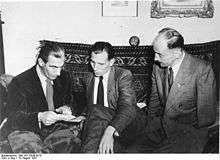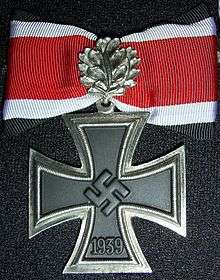Otto Ernst Remer
| Otto Ernst Remer | |
|---|---|
|
Otto Ernst Remer in 1945 | |
| Born |
18 August 1912 Neubrandenburg, German Empire |
| Died |
4 October 1997 (aged 85) Marbella, Spain |
| Allegiance |
|
| Service/branch | Wehrmacht |
| Years of service | 1932–45 |
| Rank | Generalmajor |
| Unit | 4th Panzer Division |
| Commands held | |
| Battles/wars | |
| Awards |
Knight's Cross of the Iron Cross with Oak Leaves (awarded in November 1943) |
Otto-Ernst Remer (18 August 1912 – 4 October 1997) was a German Wehrmacht officer who played a decisive role in stopping the 20 July plot of 1944 against Adolf Hitler. During the war he was wounded nine times in combat.[1] After the war he co-founded the Sozialistische Reichspartei (SRP) and advanced Holocaust denial. He is considered the "Godfather" of the post-war Nazi underground.[1]
World War II
Born in 1912, Remer attended a military academy and was commissioned as an officer in 1932 at the age of 20.[1] He took part in the invasion of Poland in 1939, the Balkans Campaign and Operation Barbarossa, the invasion of the Soviet Union. By April 1942, he was a battalion commander, and he joined the Infantry Regiment Großdeutschland. In February 1943, he commanded a battalion in the Großdeutschland Division (GD), after the Infantry Regiment GD was reformed into a division. His troops covered the withdrawal of an Waffen-SS tank corps during the Third Battle of Kharkov. He was awarded the Knight's Cross for his service as battalion commander, and in November 1943, he was awarded the Oak leaves to the Knight's Cross, which was presented by Adolf Hitler personally.[2]
20 July 1944 coup
In March 1944, Remer was appointed commander of the Infantry Regiment Großdeutschland. On 20 July 1944, an explosion took place at Adolf Hitler's army headquarters, "Wolf's Lair", in East Prussia. Otto Ernst Remer first heard of it through members of the Nazi Party and waited for official word of Hitler's fate. Remer and his unit successfully stopped the 20 July plot to seize control of the German government, following an assassination attempt on Hitler.
In the evening of 20 July, Claus Von Stauffenberg ordered Remer to arrest several Nazi officials, claiming that they were part of a coup. Upon being ordered by General Paul von Hase to arrest Minister of Propaganda Joseph Goebbels, Remer went to Goebbels' office to do so. However, Goebbels insisted that Hitler was still alive. When Remer asked for proof, Goebbels picked up the phone and asked to be put through to Hitler. Hitler gave Remer orders to crush the plot with his troops. Remer realised that he and his men had been taking orders from the mutineers. Remer and his troops reversed the results of orders given by the plotters. Remer went to the Berlin Military Headquarters and arrested the plotters, including Stauffenberg. Friedrich Fromm had the plotters executed. Remer unsuccessfully tried to dissuade Fromm since Remer was told to keep the plotters alive. That same night Remer was promoted two ranks to Oberst (colonel).
Through the rest of the war, Remer served with the Führer Begleit Brigade (FBB), a field unit formed from a Grossdeutschland cadre, in East Prussia and during the Ardennes Offensive. He was taken prisoner by the American forces, and remained a prisoner until 1947.
Neo-Nazi activities

Remer's Socialist Reich Party, which he had co-founded in 1950, was banned in 1952, after it had gathered about 360,000 supporters in Lower Saxony and Schleswig-Holstein, and won 16 seats in the state parliament. The Socialist Reich Party also won eight seats in the parliament of the state Free Hanseatic City of Bremen. The party had received financing from the Soviet Union[1] and worked with the Communist Party of Germany. The main issues of the party included Holocaust denial, where it accused the U.S. of planting fake gas chambers and films about concentration camps,[3] seesaw politics,[4] and ending Germany's puppet status with the United States.[1]
With the party banned, Remer faced criminal charges from the German government as being the successor party to the Nazis. He was hidden in the chalet of Countess Faber-Castell, an early supporter of the party, before he fled to Egypt.[4] There he served as an advisor to Gamal Abdel Nasser and worked with other expatriate Germans assisting Arab states with weapons development.[1] He was a frequent acquaintance of Johannes von Leers.[4] In 1956, Remer initiated operations in Damascus, continuing weapons proliferation. The Algerian National Liberation Front was one of his main customers.[1]
Criminal conviction and exile
Remer returned to Germany in the 1980s, creating the German Freedom Movement which advocated a reunified country and the expulsion of NATO. It was an umbrella organisation for 23 underground Nazi organisations and allowed Remer the opportunity to create a new generation of followers.[1]
From 1991 to 1994, Remer put out his own publication, the Remer-Depesche. Remer was sentenced to 22 months of imprisonment in October 1992, for writing and publishing a number of articles that were said to incite "racial hatred", through their questioning of the Holocaust. The political impact of this case upon the government is discussed in Searle's Wehrmacht Generals. His complaint over alleged violations of fairness of trial and freedom of speech was unanimously rejected by the European Commission on Human Rights.[5] He filed numerous appeals, and eventually fled to Spain, prior to his actually being incarcerated.[6]
In February 1994, Remer went into exile in Spain, in a successful effort to avoid imprisonment for his controversial public statements about the Holocaust. Remer was an avid supporter of studies by key individuals in Holocaust denial, such as Fred Leuchter and Germar Rudolf. The high court of Spain ruled against appeals made by the German government to extradite Remer, claiming that he had not committed any crime under the Spanish law. He remained a wanted man in Germany until his 1997 death in Spain at 85.
A fellow veteran of the Grossdeutschland Division had the following to say about his former commanding officer: "No judgment will be made here as to whether his decision on 20 July was right or wrong. But the consequences of his decision were so terrible, (...) that we old soldiers had expected that a man to whom destiny gave such a burden to carry until the end of his life would recognise this, and would thereafter live quietly and in seclusion. We, his former comrades, lack any sympathy for the fact that Herr Remer fails to summon up this attitude of self-effacement.[7]
Awards
- Iron Cross (1939)
- German Cross in Gold on 29 August 1942 as Hauptmann in IV./Infanterie-Regiment "Großdeutschland"[9]
- Knight's Cross of the Iron Cross with Oak Leaves
References
Citations
- 1 2 3 4 5 6 7 8 Atkins 2004, pp. 273–274.
- ↑ The Rise and Fall of the Third Reich, William L. Shirer, p. 1063 ff. 1960.
- ↑ Goodrick-Clarke 1998, p. 170.
- 1 2 3 Lee 2000, pp. 73, 134, 151.
- ↑ ECmHR admissibility decisionon the application 25096/94
- ↑ Holocaust Denial on Trial: Using History to Confront Distortions. "Biographies: Otto Remer," (retrieved on April 10, 2009).
- ↑ Baigent, Michael and Leigh, Richard. 1994. Secret Germany. London, New York: The Penguin Group.
- 1 2 Thomas 1998, p. 195.
- ↑ Patzwall & Scherzer 2001, p. 373.
- ↑ Fellgiebel 2000, p. 355.
- ↑ Fellgiebel 2000, p. 74.
Bibliography
- Atkins, Stephen E. (2004). Encyclopedia of modern worldwide extremists and extremist groups. Greenwood Publishing Group. ISBN 978-0-313-32485-7.
- Fellgiebel, Walther-Peer (2000) [1986]. Die Träger des Ritterkreuzes des Eisernen Kreuzes 1939–1945 — Die Inhaber der höchsten Auszeichnung des Zweiten Weltkrieges aller Wehrmachtteile [The Bearers of the Knight's Cross of the Iron Cross 1939–1945 — The Owners of the Highest Award of the Second World War of all Wehrmacht Branches] (in German). Friedberg, Germany: Podzun-Pallas. ISBN 978-3-7909-0284-6.
- Goodrick-Clarke, Nicholas (1998). Hitler's Priestess: Savitri Devi, the Hindu-Aryan Myth, and Neo-Nazism. NYU Press. ISBN 978-0-8147-3111-6.
- Lee, Martin A. (2000). The Beast Reawakens. ISBN 978-0-415-92546-4.
- Patzwall, Klaus D.; Scherzer, Veit (2001). Das Deutsche Kreuz 1941 – 1945 Geschichte und Inhaber Band II [The German Cross 1941 – 1945 History and Recipients Volume 2] (in German). Norderstedt, Germany: Verlag Klaus D. Patzwall. ISBN 978-3-931533-45-8.
- Rees, Philip (1990). Biographical Dictionary of the Extreme Right Since 1890. New York: Simon & Schuster. ISBN 0-13-089301-3.
- Searle, Alaric (2003). Wehrmacht Generals, West German Society, and the Debate on Rearmament, 1949–1959. Westport, CT: Praeger Publishers. ISBN 978-0-275-97968-3.
- Spezzano, Remy; McGuirl, Thomas (1997). God, Honor, Fatherland: Pictorial History of the Grossdeutschland Division 1942–1944. ISBN 0-9657584-0-0.
- Thomas, Franz (1998). Die Eichenlaubträger 1939–1945 Band 2: L–Z [The Oak Leaves Bearers 1939–1945 Volume 2: L–Z] (in German). Osnabrück, Germany: Biblio-Verlag. ISBN 978-3-7648-2300-9.
